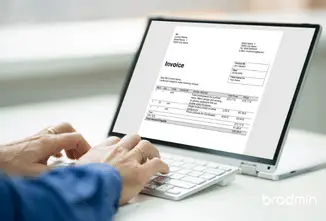Late payments typically create cash flow problems for the company, increasing the risk of not being paid at all.
Using your legal right to claim interest for late-paying customers may help encourage them to pay on time. We’ll show you how to calculate interest on late payments, plus a handy calculator.
According to the law, you have a right to charge interest per the Bank of England’s base rate and add 8%.
For example, currently, the base rate for the Bank of England is 0.1%
This means that you would charge 8.1%
The rate of calculating interest is fixed over six months.
The base rate set on 31st December was used to calculate debts between 1st January and 30th June.
Calculating the interest due to you is a straightforward process, and here’s the step-by-step process;
Start by multiplying the total amount you are owed by the rate of interest you will charge. In this case, 8.1%.
For example, if you are owed £1,000, then the interest would be £1,000 X 8.1% = £81
Next, calculate the daily interest by dividing this annual interest by the number of days 365
£81 /365 = 0.22
You would then work out the total amount due by multiplying the daily interest with the total number of days late.
For example, if the invoice has been late for 30 days, then the total interest would be;
0.22 X 30 = £6.6
Therefore, the new invoice amount would be £1006.6.
Any part payment made by the client will go towards reducing the amount owed.
For example, if the client paid £1000 for the new bill, they would now owe £6.6. This is because the daily interest would now be accrued in addition to this amount.
The amount outstanding will also change per day.
Each day, the amount keeps increasing by the interest amount, and it is good to be practical with the client about this to settle their debt.
Your VAT position?
This one is unaffected, and you only charge interest on the gross debt amount, which is inclusive of VAT. So you do not have to charge interest for the VAT, and you do not have to pay VAT on a debt that has not been paid.
Do you have a right to charge interest?
Yes. Every business has a statutory right to charge its customer’s interest over late payments. This right, however, only applies to business sales and public sector customers. You can, however, negotiate a new contract with your client if you wish.
This new agreement must provide a “substantial remedy” in case the customer still pays late. There shouldn’t be any unfair imposed terms in the contract, such as a contractual payment period that is longer than 60 days.
However, the public sector customers must pay within 30 days, plus the interest, and this cannot be lowered.
How do I claim interest from the customer?
If you decide to charge interest for the late payment of invoices, you must make a provision of this as part of your regular credit control.
Even if your intention was not to collect late paying interest, drawing your intention to do so in the contract may encourage your customers to pay on time.
Here’s how you can claim interest
When does the interest start charging?
The late payment interest is usually payable at the end of the agreed period of credit. For example, if you had given your client 30 days, then the claim will be paid 30 days from;
- The date you made the supplies, or
- The date your client was informed of the amount due,
If your supplies were made to a public authority, then the interest will be payable 30 days after the delivery, even if there was a more extended payment date agreed upon.
This contract cannot be extended past 30 days.
However, suppose you supply to another business. In that case, the interest will become payable 60 days after the delivery, and even if you agree for a more extended period, this cannot be changed.
How can I claim late payment interest, other costs, and compensation?
If you want to, you can claim late payment interest as soon as a payment becomes overdue. Then, you can claim the compensation in due course.
Reasonable costs for recovery of the debt can be claimed as and when they are incurred. You do not need to issue an invoice for the compensation, interest, and costs, but you should write and tell the customer of the amount due.
When making this claim, it is wise to let your customer know the following information;
- How much is due in terms of compensation, interest, and costs.
- How much they owe, e.g., give them the invoice number of the debt.
- How they can make payment, to whom, date, address, and the correct method.
You, however, do not need to send them any previous warning letter for claiming interest or costs, or compensation.
If you are not allowed to send an LPD – Late Payment Demand letter due to the contract terms, you could claim the contractual interest in the LBA – Letter before Action.
What if a customer objects paying the interest?
Despite the law being in place, sometimes customers may be unwilling to pay the interest on the late payment.
They, however, cannot opt-out of paying, and if the interest is disputed, here’s what you can do;
Make it very clear that you prefer agreeing on the debt and that it must be paid. If you cannot agree with the client, you would have to follow the different legal procedures of claiming payment.
You could apply pressure by placing the customer on a stop-list – Which means that you would put a stop to any more sales with the specific customer till they pay the debt.
Consider passing or selling the debt over to a third party. – This is very common, especially in long-overdue debts. Many recovery companies are willing to buy your debts at a lower cost and sell them at value, thereby making a little profit.
The purchaser of the debt may use the courts to get the payment from the client with interest.
When you sell or transfer the debt, ensure that you inform your client in writing that you have done this.
Must I warn my customers that I will be claiming the late payment interest, compensation costs, and other costs?
No. You are not obligated to inform your clients that you will be charging them for any of these costs if they fail to pay the invoice.
However, it is beneficial for your business relationship to inform them in advance about the intention to do so.
You may put it as a warning on the invoice or the contract and even discuss it with them at the initial stages of the contract.
What about reasonable debt recovery costs?
- You are allowed to claim up to £40 for any debt that is less than £1,000.
- You are allowed to charge £70 for any debt that is between £1,000 and £10,000.
- You are allowed to charge £100 for any debt that is above £10,000.
If the costs are higher than these, e.g., you are using a debt collection agency, you can claim reasonable recovery costs.
You can only claim the costs if you are claiming the interest as stipulated by the law. If you do not claim the interest, you cannot claim the costs associated with collecting the debt.
Is it wise to charge late payment fees?
It Depends. Most companies charge late payment fees for many different reasons, such as;
- They would wish to be proactive about cash flow – if you have repeatedly asked them to pay, but you aren’t getting anywhere, the process is pretty draining on your business, which could help them pay you immediately.
When you are strict with your payment policies, the chances are that you might be paid earlier, before other businesses they are probably working with.
- It demonstrates professional ethics – when you have a late payment policy, you indicate that you are unwilling to compromise on the guidelines laid out on the contract.
This will establish your company as being serious and strict. The policies and procedures dealing with late payments should remain uncompromised, so the customers learn to always pay on time.
What happens if the client has already paid, but they paid late?
Yes. You can claim compensation and interest even on invoices that have been paid but were paid late.
Interest is claimed from the period starting with the invoice date when it should have been paid and ending when the invoice was paid.
The law gives you up to six years to claim compensation and interest on an invoice.
Can I charge additional costs, and how much?
You are allowed to charge compensation of whatever the collection costs amount to.
However, if the reasonable costs for the debt recovery are more than the compensation costs, you can also charge them.
This includes costs to the business for credit control procedures and many other expenses you may have incurred while instructing your debt collection agencies or lawyers to help you collect on the debt.
Conclusion
Late Payments cost your company a lot. When cash is tied up with clients, then you are limited and cannot grow or move forward with your business.
Poor cash flow contributes to failure most of the time, and unfortunately, this is all too common most of the time. People do not want to pay their invoices.
The downside is obvious, and when you don’t have money, you cannot conduct your business successfully.
You cannot pay your bills, workers, rent, or even the company’s daily needs. Of course, some companies manage to get by with the bit of money coming in, but they may not sustain this for long if most of their money is unpaid.
Taking the right actions such as charging interest to your customers and engaging third-party companies such as debt collectors, you might be able to recover what you are owed.





![Apology letter for late payment to supplier [with examples] 5 apology letter for late payment to supplier](https://brodmin.com/wp-content/uploads/2021/09/apology-letter-for-late-payment-to-supplier.webp)
![Invoice payment terms - UK edition 2022 [+ Net calculator] 6 Invoice Payment Terms UK Edition 2021](https://brodmin.com/wp-content/uploads/2021/09/Invoice-Payment-Terms-UK-Edition-2021.webp)





